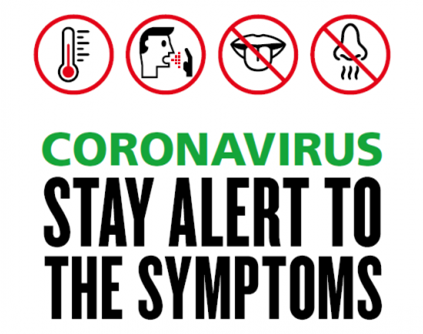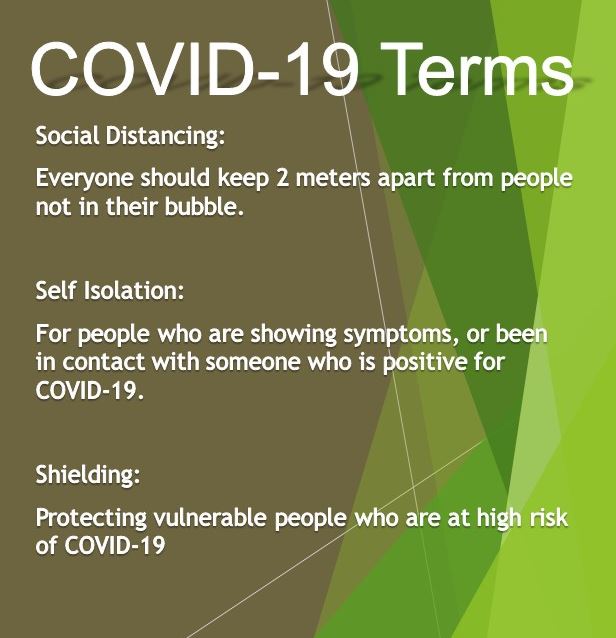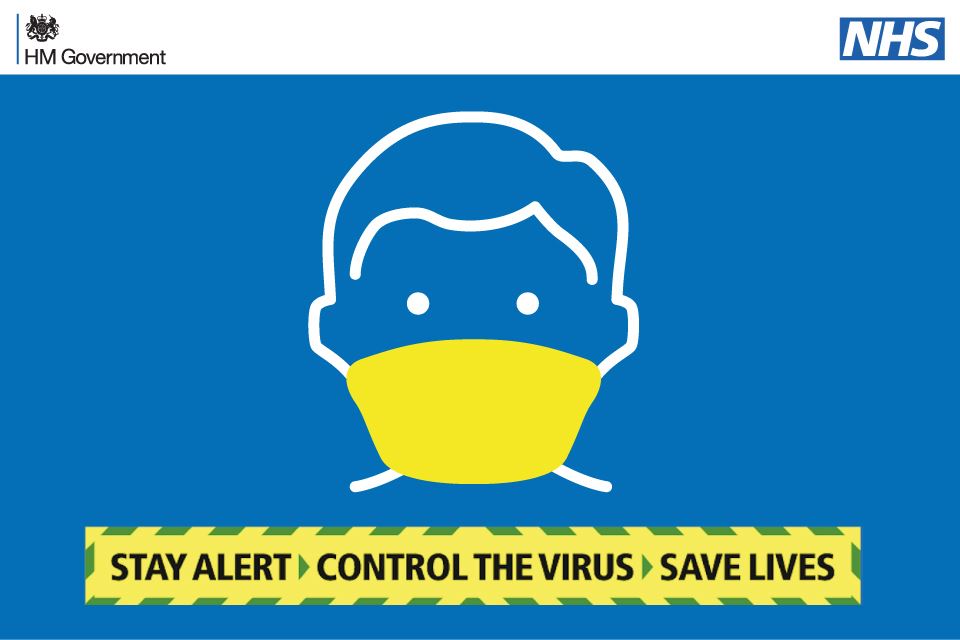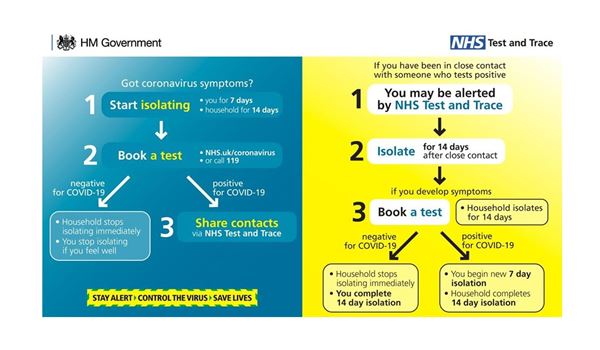Coronavirus (COVID-19)

Main symptoms
The main symptoms of coronavirus are:
- a high temperature – this means you feel hot to touch on your chest or back (you do not need to measure your temperature)
- a new, continuous cough – this means coughing a lot for more than an hour, or 3 or more coughing episodes in 24 hours (if you usually have a cough, it may be worse than usual)
- a loss or change to your sense of smell or taste – this means you've noticed you cannot smell or taste anything, or things smell or taste different to normal
Most people with coronavirus have at least 1 of these symptoms.

High & Moderate Risk
There are 2 levels of higher risk:
- high risk (clinically extremely vulnerable)
- moderate risk (clinically vulnerable)
If you're at high risk (clinically extremely vulnerable) from coronavirus (COVID-19), you were advised to take extra steps to protect yourself until 1 August 2020. This was called shielding.
In England, the risk of getting coronavirus is now low enough that you’re no longer advised to shield. There are still things you can do to protect yourself and others. You can also still get some support.
You’re no longer able to get free food parcels, but you can get help with food and medicine deliveries from an NHS volunteer. Call 0808 196 3646 (open 8am to 8pm) to get help from NHS Volunteer Responders. You can also continue to get priority supermarket delivery slots.
GOV.UK is the best place to find the most up to date information but you can also find a quick link to their guide here
Social Distancing & Tips on Staying Safe
- Keep your distance from people outside your household or support bubble
- Avoid being face-to-face with people if they are outside your household or support bubble
- Keep your hands and face as clean as possible
- Keep indoor places well ventilated
- Avoid crowded spaces
- Going to work – your employer has to ensure your place of work meets safety standards speak to your employer for advice on staying safe at work
- If you have to travel (for example, to work or school), think about how and when you travel and try to avoid peak times
- Face coverings – see details below for further information.
- Avoid shouting or singing close to people outside your household or support bubble
- Reduce the number of people you spend time with in a work setting - speak to your employer for further information
- Wash your clothes regularly
- When at work or in business or public premises, follow the advice on site
- If measures put in place to stop the spread of coronavirus are inaccessible to you, use these tools – see section on face coverings for further details.

Face Coverings
In the context of the coronavirus (COVID-19) outbreak, a face covering is something which safely covers the nose and mouth. You can buy reusable or single-use face coverings. You may also use a scarf, bandana, religious garment or hand-made cloth covering but these must securely fit round the side of the face.
- Find out how to make your own face covering
- Find out where to wear your face covering in England - you can also find details on situations you are not required to wear a face covering.
- Find out how to safely dispose of your mask
- Those who are exempt may wish to have a badge visible (this is not required by law) you can find them below
Testing
You can have a test (swab test) to check if you have coronavirus (COVID-19) now. You can choose to take the test:
- at a test site near you today and get your result tomorrow
- with a home test kit
This service is for people in England, Scotland, Wales and Northern Ireland. Get a free NHS test here.
Your results will come back with one of the following:
- negative
- positive
- unclear, void, borderline or inconclusive
If you do not get your result, call the coronavirus testing contact centre on 119 (England, Wales and Northern Ireland) or 0300 303 2713 (Scotland). The contact centre is open from 7am to 11pm. You can also find out what action you should take following each result type here.

NHS Test & Trace Service
The NHS Test and Trace service:
- Ensures that anyone who develops symptoms of coronavirus (COVID-19) can quickly be tested to find out if they have the virus, and also includes targeted asymptomatic testing of NHS and social care staff and care home residents helps trace close recent contacts of anyone who tests positive for coronavirus and, if necessary, notifies them that they must self-isolate at home to help stop the spread of the virus
- If your result comes back positive you will be contacted by the NHS Test & Trace Service via email or telephone, calls will come from 0300 0135000. You can find full information on how this service works here.
You will be contacted by the Test & Trace Service if you have been in contact with someone who has tested positive, you can find full advice on what to do if you are contacted here.
Managing Symptoms at Home
There is currently no specific treatment for coronavirus (COVID-19), but you can often ease the symptoms at home until you recover.
It can help to do the following for a high temperature:
- get lots of rest
- drink plenty of fluids (water is best) to avoid dehydration – drink enough so your pee is light yellow and clear
- take paracetamol or ibuprofen if you feel uncomfortable
Treating your cough:
If you have a cough, it's best to avoid lying on your back. Lie on your side or sit upright instead. To help ease a cough, try having a teaspoon of honey. But do not give honey to babies under 12 months.
If this does not help, you could contact a pharmacist by phone for advice about cough treatments.
Tips for treating breathlessness:
If you're feeling breathless, it can help to keep your room cool. Try turning the heating down or opening a window. Do not use a fan as it may spread the virus. Try not to panic if you're feeling breathless. This can make it worse.
You could also try:
- breathing slowly in through your nose and out through your mouth, with your lips together like you're gently blowing out a candle
- sitting upright in a chair
- relaxing your shoulders, so you're not hunched
- leaning forward slightly – support yourself by putting your hands on your knees or on something stable like a chair
NHS Video - Tips for breathlessness
If you're concerned about your symptoms and need medical advice, use the NHS 111 online coronavirus service.
Recovering From Covid
How long it takes to recover from coronavirus is different for everybody. Many people feel better in a few days or weeks and most will make a full recovery within 12 weeks. But for some people, symptoms can last longer. The chances of having long-term symptoms does not seem to be linked to how ill you are when you first get coronavirus. People who had mild symptoms at first can still have long-term problems.
As you find yourself or a family member recovering from COVID-19 you may still be coming to terms with the impact the virus has had on both your body and mind. You can find more information below:
Bereavement
Losing a loved one under any circumstances is one of the most difficult emotional experiences that we go through, and it can be even tougher at a time when we have to self-isolate and socially distance from friends and family. To help you get through we have complied information from leading charities to help.
- The British Phsycological Society: Supporting yourself and others
- Mental Health Foundation: Change, loss and bereavement
- Mind: Coronavirus and your wellbeing
Woodlands Surgery is here for those who need further support coping with loss during this unprescendented time, please see our full page on bereavement or call 01223697600 to arrange an appointment with a doctor.
Travel Information
Travel advice is constantly changing as the government monitor international situations closely. You can find full up to date information on the GOV.UK page.
We understand that patients will be travelling abroad, if you do make an appointment and have recently returned from any foreign country please let a member of staff know at the point of booking.
If you are required to self isolate for 14 days following a visit from a foreign country please do not attend the surgery. You can still book a telephone appointment with a doctor or nurse by calling 01223697600.
Antibody Test
An antibody test is a blood test to check if you’ve had coronavirus (COVID-19) before.
An antibody test can tell you if it's likely you've had coronavirus before. However it does not work for everyone, as some people who've had the virus do not have antibodies.
An antibody test does not tell you:
- if you're immune to coronavirus
- if you can or cannot spread the virus to other people
If you have a positive test you should still follow social distancing rules like everyone else as it's not known if having antibodies stops you getting the virus again.
The antibody test is not widely available & home antibody test kits are not currently recommended, as it has not been confirmed if they're safe and reliable yet. You can pay for a test to be done at a private clinic if you want to.
Take Part In Research
Find out about coronavirus (COVID-19) health research studies and how you may be able to take part.
Page created: 13 August 2020